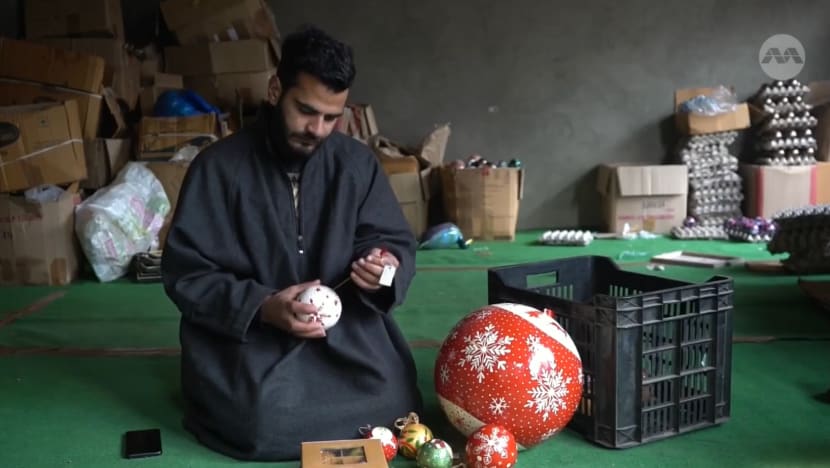SRINAGAR: Craftsman Mohammad Iqbal Shah has been making a wide array of Christmas-related goods and other festive items for many years.
He and his team prepare papier mache by soaking paper in water, turning it into pulp and mixing it with flour and glue.
The mixture is applied onto wooden or plastic bases to create objects like balls, bells, stars and Santa Claus figurines, which are then dried in the sun at Shah’s workshop.
But in the past few years, business has been on a steep decline due to wars in Europe and the Middle East, he told CNA.
“We used to make over 100,000 pieces every year. This year, I believe production has dropped by almost 50 per cent because of the low demand in the international market,” he added.
Shah’s workshop is located in the Khanyar neighbourhood in Srinagar, the largest city in Indian-administered union territory Jammu and Kashmir.
He is among a long line of artisans who have been in the trade since the 15th century, when the art of papier mache – which has roots in ancient China – was introduced to Kashmir by artisans from Central Asia with the arrival of Islam.
Over time, the craft was passed down through generations.
Both local residents and tourists often buy these handmade papier mache items for their beautiful designs. But low wages forced many craftsmen to quit their ancestral work and look for better opportunities.
To keep the craft alive, those who stayed in the trade began exporting their products to European and American markets, focusing on Christmas-related goods. These exports can command a higher price tag, allowing the artisans to earn a better livelihood.
It is estimated that the global papier mache trade is worth about US$30 billion annually.

“For a long time, papier mache has been affiliated with the international market,” said Mohammad Mehdi, owner of handicrafts store Sunbeams in Srinagar.
“During Christmas, products like balls and bells were exported in millions. Similarly, during Easter, a large number of eggs were sent abroad.”
CLIENTS DO NOT WANT TO BUY IN BULK
Major exporters have linked the declining demand to the Russia-Ukraine war, which began almost three years ago, as well as conflict in the Middle East that was triggered by the Israel-Hamas war in October last year.
These exporters said their clients are now hesitant to buy in bulk because they are uncertain about whether people will purchase these items during difficult times.
“Our customers in Europe, the Middle East and America are afraid of importing our products,” said manufacturer and exporter Ubaid Ali.
“They tell us they don’t know what will happen in the future and people nowadays prefer to save money rather than spend it.”
The art form was already in trouble after recent setbacks that impacted the flow of tourists into the region.
These include the devastating 2014 Kashmir floods, the Indian government’s 2019 decision to revoke the partial autonomy of Jammu and Kashmir, and the global COVID-19 pandemic in 2020.
In response, manufacturers like Ubaid have been looking to produce new products in hopes that they can attract the attention of clients.
But workers involved in the production of Christmas items have not been able to pivot as easily.
Meanwhile, artisans like Shah said they hope for peace, and that bringing these conflicts to an end will allow people to celebrate festivals and other occasions as they should.
